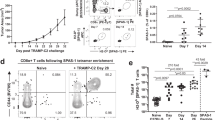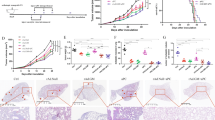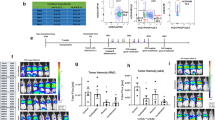Abstract
We developed a preclinical prostate cancer model to study the feasibility of adoptive immunotherapy for residual tumor following neo-adjuvant in situ adenoviral-vector-mediated interleukin 12 (AdIL-12) gene therapy. Splenocytes were obtained from mice with orthotopic 178-2 BMA metastatic mouse prostate cancers treated previously with AdIL-12, or a vector with the IL-12 genes plus the costimulatory gene B7-1 (AdIL-12/B7), or a control gene (Adβgal). The splenocytes were subsequently injected intravenously into syngeneic mice bearing orthotopic 178-2 BMA tumors generated 3 days previously. Significant orthotopic tumor growth suppression was achieved with splenocytes derived from mice whose tumors had been injected with AdIL-12 compared to splenocytes from control Adβgal mice (P=0.0005) and splenocytes from AdIL-12/B7-treated mice significantly suppressed spontaneous lung metastases compared to splenocytes from control mice (P=0.0356). Adoptive transfer of splenocytes from either AdIL-12 (P=0.004) or AdIL-12/B7 (P=0.009)-treated mice significantly prolonged survival relative to controls. Transfer of NK and tumor-specific CTL activities was detected and depletion of CD4+ and CD8+ T cells by in vitro antibody-mediated complement lysis of the splenocytes prior to injection abrogated the effects. Systemic IL-12 administration delivered by intramuscular AdIL-12 injection enhanced the antitumor effects of adoptive splenocyte transfer and boosted the CTL response. Our data provide evidence that this form of adoptive immunotherapy can enhance the effectiveness of neo-adjuvant in situ IL-12 gene therapy in cases of persistent malignancy.
This is a preview of subscription content, access via your institution
Access options
Subscribe to this journal
Receive 12 print issues and online access
$259.00 per year
only $21.58 per issue
Buy this article
- Purchase on Springer Link
- Instant access to full article PDF
Prices may be subject to local taxes which are calculated during checkout






Similar content being viewed by others
References
Moul JW . Prostate specific antigen only progression of prostate cancer. J Urol 2000; 163: 1632–1642.
Blute ML, Nativ O, Zincke H, Farrow GM, Therneau T, Lieber MM . Pattern of failure after radical retropubic prostatectomy for clinically and pathologically localized adenocarcinoma of the prostate: influence of tumor deoxyribonucleic acid ploidy. J Urol 1989; 142: 1262–1265.
Epstein JI, Carmichael M, Partin AW, Walsh PC . Is tumor volume an independent predictor of progression following radical prostatectomy? A multivariate analysis of 185 clinical stage B adenocarcinomas of the prostate with 5 years of followup. J Urol 1993; 149: 1478–1481.
Sakr WA, Macoska JA, Benson P, Grignon DJ, Wolman SR, Pontes JE et al. Allelic loss in locally metastatic, multisampled prostate cancer. Cancer Res 1994; 54: 3273–3277.
Qian J, Bostwick DG, Takahashi S, Borell TJ, Herath JF, Lieber MM et al. Chromosomal anomalies in prostatic intraepithelial neoplasia and carcinoma detected by fluorescence in situ hybridization. Cancer Res 1995; 55: 5408–5414.
Rioux-Leclercq NC, Chan DY, Epstein JI . Prediction of outcome after radical prostatectomy in men with organ-confined Gleason score 8 to 10 adenocarcinoma*1. Urology 2002; 60: 666–669.
Thompson TC, Park SH, Timme TL, Ren C, Eastham JA, Donehower LA et al. Loss of p53 function leads to metastasis in ras+myc-initiated mouse prostate cancer. Oncogene 1995; 10: 869–879.
Timme TL, Satoh T, Tahir SA, Wang H, Teh BS, Butler EB et al. Therapeutic targets for metastatic prostate cancer. Curr Drug Targets 2003; 4: 251–261.
Eastham JA, Chen SH, Sehgal I, Yang G, Timme TL, Hall SJ et al. Prostate cancer gene therapy: herpes simplex virus thymidine kinase gene transduction followed by ganciclovir in mouse and human prostate cancer models. Hum Gene Ther 1996; 7: 515–523.
Hall SJ, Mutchnik SE, Chen SH, Woo SL, Thompson TC . Adenovirus-mediated herpes simplex virus thymidine kinase gene and ganciclovir therapy leads to systemic activity against spontaneous and induced metastasis in an orthotopic mouse model of prostate cancer. Int J Cancer 1997; 70: 183–187.
Hall SJ, Mutchnik SE, Yang G, Timme TL, Nasu Y, Bangma CH et al. Cooperative therapeutic effects of androgen ablation and adenovirus- mediated herpes simplex virus thymidine kinase gene and ganciclovir therapy in experimental prostate cancer. Cancer Gene Ther 1999; 6: 54–63.
Ayala G, Wheeler TM, Shalev M, Thompson TC, Miles B, Aguilar-Cordova E et al. Cytopathic effect of in situ gene therapy in prostate cancer. Hum Pathol 2000; 31: 866–870.
Miles BJ, Shalev M, Aguilar-Cordova E, Timme TL, Lee HM, Yang G et al. Prostate-specific antigen response and systemic T cell activation after in situ gene therapy in prostate cancer patients failing radiotherapy. Hum Gene Ther 2001; 12: 1955–1967.
Teh BS, Ayala G, Aguilar L, Mai WY, Timme TL, Vlachaki MT et al. Phase I-II trial evaluating combined intensity-modulated radiotherapy and in situ gene therapy with or without hormonal therapy in treatment of prostate cancer-interim report on PSA response and biopsy data. Int J Radiat Oncol Biol Phys 2004; 58: 1520–1529.
Satoh T, Teh BS, Timme TL, Mai WY, Gdor Y, Kusaka N et al. Enhanced systemic T-cell activation after in situ gene therapy with radiotherapy in prostate cancer patients. Int J Radiat Oncol Biol Phys 2004; 59: 562–571.
Nasu Y, Bangma CH, Hull GW, Lee HM, Hu J, Wang J et al. Adenovirus-mediated interleukin-12 gene therapy for prostate cancer: suppression of orthotopic tumor growth and pre-established lung metastases in an orthotopic model. Gene Ther 1999; 6: 338–349.
Hull GW, McCurdy MA, Nasu Y, Bangma CH, Yang G, Shimura S et al. Prostate cancer gene therapy: comparison of adenovirus-mediated expression of interleukin 12 with interleukin 12 plus B7-1 for in situ gene therapy and gene-modified, cell-based vaccines. Clin Cancer Res 2000; 6: 4101–4109.
Satoh T, Saika T, Ebara S, Kusaka N, Timme TL, Yang G et al. Macrophages transduced with an adenoviral vector expressing interleukin 12 suppress tumor growth and metastasis in a preclinical metastatic prostate cancer model. Cancer Res 2003; 63: 7853–7860.
Saika T, Satoh T, Kusaka N, Ebara S, Mouraviev VB, Timme TL et al. Route of administration influences the antitumor effects of bone marrow-derived dendritic cells engineered to produce interleukin-12 in a metastatic mouse prostate cancer model. Cancer Gene Ther 2004; 11: 317–324.
Satoh T, Timme TL, Saika T, Ebara S, Yang G, Wang J et al. Adenoviral vector-mediated mRTVP-1 gene therapy for prostate cancer. Hum Gene Ther 2003; 14: 91–101.
Nasu Y, Bangma C, Hull G, Yang G, Wang J, Shimura S et al. Combination gene therapy with adenoviral vector-mediated HSV-tk+GCV and IL-12 in an orthotopic mouse model for prostate cancer. Prostate Cancer Prostatic Dis 2001; 4: 44–55.
Lee HM, Timme TL, Thompson TC . Resistance to lysis by cytotoxic T cells: a dominant effect in metastatic mouse prostate cancer cells. Cancer Res 2000; 60: 1927–1933.
Gdor Y, Timme TL, Miles BJ, Kadmon D, Thompson TC . Gene therapy for prostate cancer. Expert Rev Anticancer Ther 2002; 2: 309–321.
Dudley ME, Wunderlich JR, Robbins PF, Yang JC, Hwu P, Schwartzentruber DJ et al. Cancer regression and autoimmunity in patients after clonal repopulation with antitumor lymphocytes. Science 2002; 298: 850–854.
Dudley ME, Wunderlich JR, Yang JC, Hwu P, Schwartzentruber DJ, Topalian SL et al. A phase I study of nonmyeloablative chemotherapy and adoptive transfer of autologous tumor antigen-specific T lymphocytes in patients with metastatic melanoma. J Immunother 2002; 25: 243–251.
Trinchieri G . Interleukin-12 and the regulation of innate resistance and adaptive immunity. Nat Rev Immunol 2003; 3: 133–146.
Mazzolini G, Qian C, Narvaiza I, Barajas M, Borras-Cuesta F, Xie X et al. Adenoviral gene transfer of interleukin 12 into tumors synergizes with adoptive T cell therapy both at the induction and effector level. Hum Gene Ther 2000; 11: 113–125.
Hu J, Kindsvogel W, Busby S, Bailey MC, Shi YY, Greenberg PD . An evaluation of the potential to use tumor-associated antigens as targets for antitumor T cell therapy using transgenic mice expressing a retroviral tumor antigen in normal lymphoid tissues. J Exp Med 1993; 177: 1681–1690.
Sun Y, Qian C, Peng D, Prieto J . Gene transfer to liver cancer cells of B7-1 plus interleukin 12 changes immunoeffector mechanisms and suppresses helper T cell type 1 cytokine production induced by interleukin 12 alone. Hum Gene Ther 2000; 11: 127–138.
Atkins MB, Robertson MJ, Gordon M, Lotze MT, DeCoste M, DuBois JS et al. Phase I evaluation of intravenous recombinant human interleukin 12 in patients with advanced malignancies. Clin Cancer Res 1997; 3: 409–417.
Leonard JP, Sherman ML, Fisher GL, Buchanan LJ, Larsen G, Atkins MB et al. Effects of single-dose interleukin-12 exposure on interleukin-12-associated toxicity and interferon-gamma production. Blood 1997; 90: 2541–2548.
Trudel S, Trachtenberg J, Toi A, Sweet J, Li ZH, Jewett M et al. A phase I trial of adenovector-mediated delivery of interleukin-2 (AdIL-2) in high-risk localized prostate cancer. Cancer Gene Ther 2003; 10: 755–763.
Belldegrun A, Tso CL, Zisman A, Naitoh J, Said J, Pantuck AJ et al. Interleukin 2 gene therapy for prostate cancer: phase I clinical trial and basic biology. Hum Gene Ther 2001; 12: 883–892.
Acknowledgements
This work was supported by grants from the NCI (ROI-50588) and Specialized Program for Research Excellence (SPORE, P50-58204) and a grant from the DOD. Portions of this work were conducted in facilities provided by the Houston VA Medical Center.
Author information
Authors and Affiliations
Corresponding author
Rights and permissions
About this article
Cite this article
Saika, T., Kusaka, N., Mouraviev, V. et al. Therapeutic effects of adoptive splenocyte transfer following in situ AdIL-12 gene therapy in a mouse prostate cancer model. Cancer Gene Ther 13, 91–98 (2006). https://doi.org/10.1038/sj.cgt.7700872
Received:
Revised:
Accepted:
Published:
Issue Date:
DOI: https://doi.org/10.1038/sj.cgt.7700872



